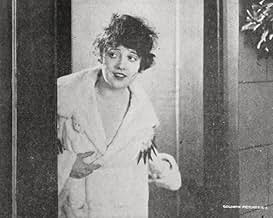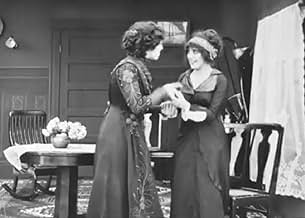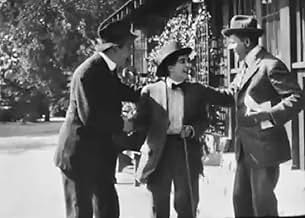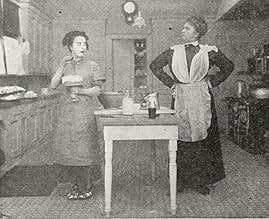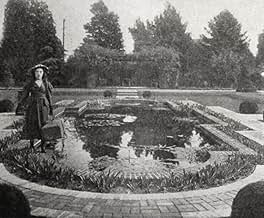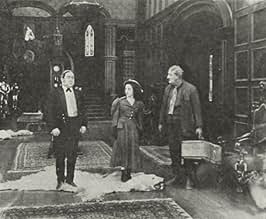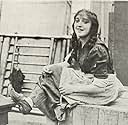Mabel Normand(1892-1930)
- Actress
- Director
- Writer
Mabel Normand was one of the comedy greats of early film. In an era when women are deemed 'not funny enough' it seems film history has forgotten her contributions. Her films debuted the Keystone Cops, Charlie Chaplin's tramp and the pie in the face gag. She co-starred with both Chaplin and Roscoe "Fatty" Arbuckle in a series of shorts. She was a star in the first Keystone Comedy as well as the first feature film comedy. She was the only comedian to work with Charles Chaplin , Roscoe "Fatty" Arbuckle, Mack Sennett, D.W. Griffith, Harold Lloyd, Mary Pickford, Hal Roach, Stan Laurel, Oliver Hardy, Fred Mace, Fred Sterling and John Bunny (she and Buster Keaton never had a chance to work together but they were friends.)
Born in Staten Island, New York to Claude and Mary Normand. Normand started out as an artist model for Charles Dana Gibson (creator of the Gibson girl). Friends suggested she try out for the new medium of film and she did, working as an extra in Kalem and Biograph shorts. With Biograph's move to California she went to work for Vitagraph where she made a series of comedic shorts as 'Betty', one co-starring the first comedy film star John Bunny.
Eventually Normand returned to Biograph where she began working with Mack Sennett on comedic shorts that would eventually turn into Keystone Comedies. Normand and Sennett were lovers, close friends and close co-workers. All of Sennett's early ideas seemed to revolve around Normand. His creation of Keystone was contingent on Normand joining him; and though he would underpay her as he underpaid everyone he worked with, he insisted Normand have credit and say in the company. When Normand eventually left Keystone for Goldwyn, Sennett left soon after.
By 1912 Normand was writing her own films and by 1914 she was directing her films. By this point she was a major star, continually topping fan polls by new movie magazines. While the discovery of Charlie Chaplin varies from telling to telling, everyone involved agreed Sennett would not have hired (or kept him on) had it not been for Normand. Chaplin's second short for the company was Normand's "Mabel's Strange Predicament" which she starred and directed in. This was the first film Chaplin created his iconic tramp character for.
Chaplin and Normand had a comedic chemistry and would go on to team in a series of shorts until Chaplin left Keystone in 1915. As Chaplin's star rose many fan magazines began to call Normand a 'female Chaplin'. Normand and Chaplin had similar subtle mannerisms and the influence Normand had on Chaplin can not be understated. Before Chaplin left Keystone, they starred, alongside Marie Dressler, in "Tillie's Punctured Romance" the first full length comedy film.
With the loss of Chaplin, Normand and Roscoe "Fatty" Arbuckle began to team together in a series of shorts (though they had acted together before). This series was also popular and the pair continued acting together until they both left Keystone for better pay.
Sennett and Normand became engaged around this time, though the engagement ended when Sennett was caught cheating on Normand. Friends report she suffered a severe head injury when Sennett's fling threw a vase at Normand's head. Those who knew Normand all believed Sennett was the love of her life; and she his. However they would never reconcile romantically. Sennett did convince Normand to create her own production company "Mabel Normand Film Company" to make her own features. The first project was "Mickey" and Sennett's handling of her business affairs resulted in the film not being released until 1918 (or having a definite version).
Normand dissolved the company and signed with Goldwyn where she went on to make comedy features. These movies would be more akin to sitcoms: they were shorter than a lot of features, but still features. Many are lost though several have turned up in the past 10 years.
Normand once again signed with Sennett to make features and this would result in her final feature films. However this would be a rocky venture. Normand's health was hit or miss (she had been diagnosed with tuberculosis when she was 10) and seemed to be worse than better. She also was drinking heavily. In 1922 her friend William Desmond Taylor was murdered. This case would become 'the case of the century' and became a media circus, it is still unsolved. Though Normand was cleared (she had been seen leaving his house with him waving goodbye to her; she was likely the last person to see him alive), the association left an unwelcome tarnish on her soon after the scandalous death of her friend Olive Thomas, and the unfair trial of Roscoe Arbuckle.
Normand continued working, making The Extra Girl. Soon after its release in 1923 she was again near another crime (a butler was shot at a party she attended; though he survived.) Soon after Normand took a break from film.
By 1926 Normand was ready for a comeback. She signed with Hal Roach to make comedy shorts. These were well received and by 1928 she had signed with the William Morris Agency to make talkies. However she did not realize how sick she was and her health soon interrupted these plans.
Over the years Normand's tuberculosis has turned into rumors of a drug addiction. This started during the Taylor scandal when it was claimed that maybe he had been killed for interrupting a drug ring, and maybe Normand was part of it. While not prominent during her life it has become more commonly believed as time has passed despite no evidence. Normand's family, estate and personal nurse were all adamant she had never used any drugs. Sadly this rumor has become common place in Hollywood lore.
Normand's drinking increased as did her partying. During one party she decided to marry longtime friend Lew Cody at 2am. She instantly regretted the marriage and they continued living separately. As Normand's health decreased and she was committed to a sanitarium (akin to a hospital/hospice in modern terms) by 1929. She died in 1930 from tuberculosis.
Born in Staten Island, New York to Claude and Mary Normand. Normand started out as an artist model for Charles Dana Gibson (creator of the Gibson girl). Friends suggested she try out for the new medium of film and she did, working as an extra in Kalem and Biograph shorts. With Biograph's move to California she went to work for Vitagraph where she made a series of comedic shorts as 'Betty', one co-starring the first comedy film star John Bunny.
Eventually Normand returned to Biograph where she began working with Mack Sennett on comedic shorts that would eventually turn into Keystone Comedies. Normand and Sennett were lovers, close friends and close co-workers. All of Sennett's early ideas seemed to revolve around Normand. His creation of Keystone was contingent on Normand joining him; and though he would underpay her as he underpaid everyone he worked with, he insisted Normand have credit and say in the company. When Normand eventually left Keystone for Goldwyn, Sennett left soon after.
By 1912 Normand was writing her own films and by 1914 she was directing her films. By this point she was a major star, continually topping fan polls by new movie magazines. While the discovery of Charlie Chaplin varies from telling to telling, everyone involved agreed Sennett would not have hired (or kept him on) had it not been for Normand. Chaplin's second short for the company was Normand's "Mabel's Strange Predicament" which she starred and directed in. This was the first film Chaplin created his iconic tramp character for.
Chaplin and Normand had a comedic chemistry and would go on to team in a series of shorts until Chaplin left Keystone in 1915. As Chaplin's star rose many fan magazines began to call Normand a 'female Chaplin'. Normand and Chaplin had similar subtle mannerisms and the influence Normand had on Chaplin can not be understated. Before Chaplin left Keystone, they starred, alongside Marie Dressler, in "Tillie's Punctured Romance" the first full length comedy film.
With the loss of Chaplin, Normand and Roscoe "Fatty" Arbuckle began to team together in a series of shorts (though they had acted together before). This series was also popular and the pair continued acting together until they both left Keystone for better pay.
Sennett and Normand became engaged around this time, though the engagement ended when Sennett was caught cheating on Normand. Friends report she suffered a severe head injury when Sennett's fling threw a vase at Normand's head. Those who knew Normand all believed Sennett was the love of her life; and she his. However they would never reconcile romantically. Sennett did convince Normand to create her own production company "Mabel Normand Film Company" to make her own features. The first project was "Mickey" and Sennett's handling of her business affairs resulted in the film not being released until 1918 (or having a definite version).
Normand dissolved the company and signed with Goldwyn where she went on to make comedy features. These movies would be more akin to sitcoms: they were shorter than a lot of features, but still features. Many are lost though several have turned up in the past 10 years.
Normand once again signed with Sennett to make features and this would result in her final feature films. However this would be a rocky venture. Normand's health was hit or miss (she had been diagnosed with tuberculosis when she was 10) and seemed to be worse than better. She also was drinking heavily. In 1922 her friend William Desmond Taylor was murdered. This case would become 'the case of the century' and became a media circus, it is still unsolved. Though Normand was cleared (she had been seen leaving his house with him waving goodbye to her; she was likely the last person to see him alive), the association left an unwelcome tarnish on her soon after the scandalous death of her friend Olive Thomas, and the unfair trial of Roscoe Arbuckle.
Normand continued working, making The Extra Girl. Soon after its release in 1923 she was again near another crime (a butler was shot at a party she attended; though he survived.) Soon after Normand took a break from film.
By 1926 Normand was ready for a comeback. She signed with Hal Roach to make comedy shorts. These were well received and by 1928 she had signed with the William Morris Agency to make talkies. However she did not realize how sick she was and her health soon interrupted these plans.
Over the years Normand's tuberculosis has turned into rumors of a drug addiction. This started during the Taylor scandal when it was claimed that maybe he had been killed for interrupting a drug ring, and maybe Normand was part of it. While not prominent during her life it has become more commonly believed as time has passed despite no evidence. Normand's family, estate and personal nurse were all adamant she had never used any drugs. Sadly this rumor has become common place in Hollywood lore.
Normand's drinking increased as did her partying. During one party she decided to marry longtime friend Lew Cody at 2am. She instantly regretted the marriage and they continued living separately. As Normand's health decreased and she was committed to a sanitarium (akin to a hospital/hospice in modern terms) by 1929. She died in 1930 from tuberculosis.

